
"Crazy Little Thing Called Love" is a song by the British rock band Queen. Written by Freddie Mercury in 1979, the track is included on their 1980 album The Game, and also appears on the band's compilation album Greatest Hits in 1981. The song peaked at number two in the UK Singles Chart in 1979, becoming the group's first number-one single on the Billboard Hot 100 in the US in 1980, remaining there for four consecutive weeks. It topped the Australian ARIA Charts for seven weeks. It was the band's final single release of the 1970s.
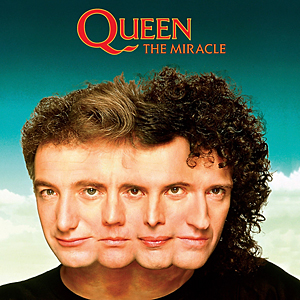
The Miracle is the thirteenth studio album by the British rock band Queen, released on 22 May 1989 by Parlophone Records and Capitol Records in both the United Kingdom and the U.S. respectively, where it was the band's only studio album to be released on latter label. The album was recorded as the band recovered from Brian May's marital problems and Freddie Mercury's HIV diagnosis in 1987. Recording started in January 1988 and lasted for an entire year. The album was originally going to be called The Invisible Men, but three weeks before the release, according to Roger Taylor, they changed the name to The Miracle. It was also the last Queen album with a photo of the band on the front cover.

"I Was Born to Love You" is a 1985 song by Freddie Mercury that was released as a single from his first solo album, Mr. Bad Guy. After Mercury's death, Queen re-worked this song for their album Made in Heaven in 1995, by having the other members play their instrumental parts over the original track, transforming the song from disco to rock. The Queen version from the Made in Heaven album also includes snippets of Mercury's ad-lib vocals taken from "A Kind of Magic" and from "Living on My Own".

"Innuendo" is a song by the British rock band Queen. Written by Freddie Mercury and Roger Taylor but credited to Queen, it is the opening track on the album of the same name (1991), and was released as the first single from the album. The single debuted at number one on the UK Singles Chart in January 1991, the band's first number-one hit since "Under Pressure" in 1981, and additionally reached the top ten in ten other countries. It is included on the band's second compilation album Greatest Hits II. It was described as "the band's first complex work released after the 1970s".
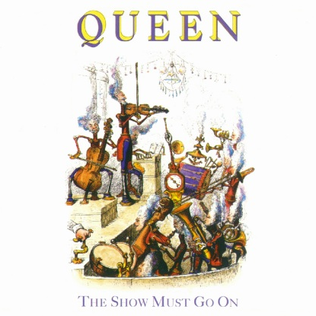
"The Show Must Go On" is a song by British rock band Queen, featured as the twelfth and final track on their 1991 album, Innuendo. It is credited to Queen, but written mainly by Brian May. The song chronicles the effort of frontman Freddie Mercury continuing to perform despite approaching the end of his life, although his diagnosis with HIV/AIDS had not yet been made public in spite of ongoing media speculation claiming that he was seriously ill. When the band recorded the song in 1990, Mercury's condition had deteriorated to the point that May had concerns as to whether he was physically capable of singing it. May recalls; "I said, 'Fred, I don't know if this is going to be possible to sing.' And he went, 'I'll fucking do it, darling'—vodka down—and went in and killed it, completely lacerated that vocal".

"No-One But You " is the final single recorded by the British rock band Queen. Recorded and released in 1997, six years after the death of lead singer Freddie Mercury, it is the only Queen recording to feature a three-piece lineup: guitarist Brian May, drummer Roger Taylor, and bassist John Deacon. May and Taylor share lead vocals. The song was released on the album Queen Rocks and it was also released as a double a-side single with "Tie Your Mother Down". It was later included on the compilation album Greatest Hits III.

"Spread Your Wings" is a power ballad by the rock band Queen, from their 1977 album News of the World. Written by bassist John Deacon, it was released as the A-side of the single "Spread Your Wings"/"Sheer Heart Attack" in 1978. According to music writer Benoit Clerc, "Spread Your Wings" was chosen as the 2nd single from News of the World because the band regretted releasing "Tie Your Mother Down" as a single from A Day at the Races over Deacon's "You and I."

"Breakthru" is a song by the British rock band Queen. Written by Freddie Mercury and Roger Taylor but credited to Queen, it was released in June 1989 from the album The Miracle. The single reached number seven in the UK, and peaked at number 6 in the Netherlands and Ireland, but failed to chart in the US. The song is notable for its video where the group is performing the song on an open platform of a fast-moving steam train.
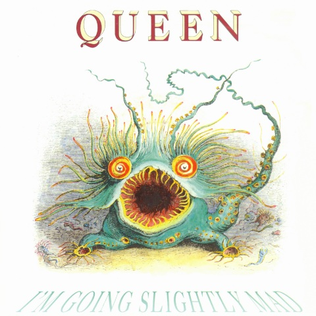
"I'm Going Slightly Mad" is a song by the British rock band Queen. Written by Freddie Mercury but credited to Queen, with uncredited lyrical contributions by Peter Straker, it was released as the second single from the band's 1991 album Innuendo. The song was released as a single on 4 March 1991, a month after the release of the album. The lyrics and the accompanying music video project the song as humorous and light-hearted, despite the lyrics dealing with the mental decline Mercury was experiencing as one of the effects of advancing AIDS.

"Too Much Love Will Kill You" is a song written by British guitarist Brian May of Queen, Frank Musker and Elizabeth Lamers. The song reflected the breakdown of May's first marriage and attraction to his future wife, Anita Dobson. It was first recorded by Queen around 1988 or before, and was intended to be on the band's The Miracle album in 1989, but did not make the cut due to legal disputes following the band's decision that all songs on the album would be written by the group as opposed to individuals.

"I Want It All" is a song by British rock band Queen, featured on their 1989 studio album, The Miracle. Written by guitarist and vocalist Brian May and produced by David Richards, it was released as the first single from the album on 2 May 1989. "I Want It All" reached number three on the singles charts of the United Kingdom, Finland, Ireland and New Zealand, as well as on the US Billboard Album Rock Tracks chart. Elsewhere, it peaked at number two in the Netherlands and charted within the top 10 in Australia, Belgium, Germany, Norway and Switzerland. With its message about fighting for one's own goals it became an anti-apartheid protest song in South Africa.
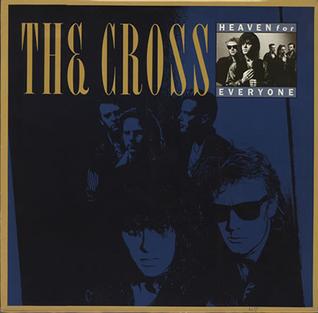
"Heaven for Everyone" is a song written by Queen drummer Roger Taylor. It originally appeared on his side project the Cross's album Shove It, with Freddie Mercury as a guest vocalist, and it is the album's fourth track. It was reworked with Queen's music and appeared in the 1995 album Made in Heaven where it was the seventh track, and was released as the first single – four years after Mercury's death. Queen's version reached number two on the UK Singles Chart while peaking at number one in Hungary and becoming a top-ten hit in several other European nations. In 1999 it was included in Queen’s compilation album Greatest Hits III.

"Friends Will Be Friends" is a song performed by Queen, written by Freddie Mercury and John Deacon, released on 9 June 1986 as a single for the album A Kind of Magic. It was the band's 30th single in the UK upon its release, reaching number 14 in the UK.
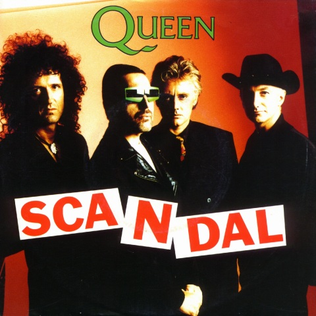
"Scandal" is a song by the British rock band Queen. It was released as the fourth single from their 1989 album The Miracle and peaked at #25 in the UK. The single was released in the United States but failed to chart.
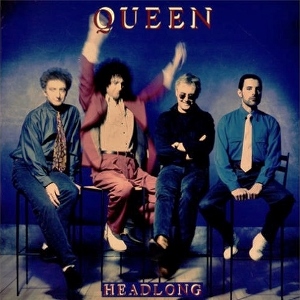
"Headlong" is a song by British rock band Queen, released as the third single from their fourteenth studio album, Innuendo (1991). The song was written by Queen guitarist Brian May, who intended to record it for his then-upcoming solo album Back to the Light (1992), but when he heard Queen lead singer Freddie Mercury sing the track, he allowed it to become a Queen song. As with all the songs on Innuendo, the track was promptly credited to the entire band.

"It's a Hard Life" is a song by the British rock band Queen, written by lead singer Freddie Mercury. It was featured on their 1984 album The Works, and it was the third single from that album. In 1991 it was included in the band’s second compilation album Greatest Hits II.

"The Invisible Man" is a song by the British rock band Queen, written by drummer Roger Taylor but credited to Queen. The song is sung mostly by Freddie Mercury, with vocal contributions from Taylor. The song was released in August 1989 as the third single from the bands album The Miracle. Taylor claims that he got the inspiration to create the song while reading a book, and the bassline instantly came to his imagination. The song title was inspired by the H. G. Wells novel of the same name.
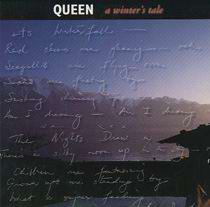
"A Winter's Tale" is a song by Queen, from the album Made in Heaven, released in 1995 after Freddie Mercury's death in 1991. It was written after the Innuendo sessions, inspired as Mercury was staring out the windows of various places in Montreux. The song has a psychedelic, dreamy feel, and describes what Mercury saw outside the windows.

"Made in Heaven" is the third single recorded by Freddie Mercury, and his fourth release as a solo artist. Originally featured in Mercury's first solo album, Mr. Bad Guy, the song was modified and published as a 45 rpm single paired with "She Blows Hot and Cold", described on the record sleeve as 'A Brand New Track'. The single reached No. 57 on the UK Singles Chart.
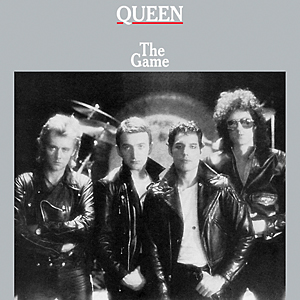
The Game is the eighth studio album by the British rock band Queen. It was released on 30 June 1980 by EMI Records in the UK and by Elektra Records in the US. The Game features a different sound from its predecessor, Jazz (1978). The Game was the first Queen album to use a synthesizer.




















